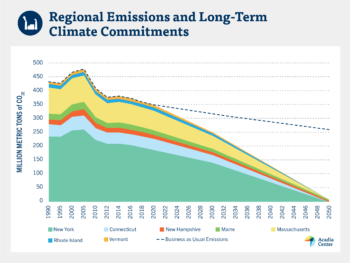Acadia Center’s Climate Planning work provides a roadmap between the present and the zero-emissions future our climate requires. Engaging in long-term climate planning informs our other initiatives and is the impetus for our world-class analysis of the solutions most effective in addressing the climate crisis, increasing equity, and sustaining economic viability.
Our priority work areas include:
- Participate and Influence State, Regional and Private Sector Climate Plans. Several states such as Massachusetts, Connecticut, Maine and others are engaging in state climate plans, establishing goals and identifying policies to pursue. Acadia Center is participating in these processes to recommend and influence action and seek to ensure that ambitious effective plans are adopted. Private sector plans developed by utilities and energy companies are also areas where Acadia Center is engaged in commenting and influencing outcomes.
- Specific Consumer, Equity and Technology Assessments. Acadia Center researches emissions, cost and other information surrounding a specific technology or issue. These can include how to improve energy efficiency treatment of sub-standard housing, to ways to price and support solar power, to the emissions profiles of biomass, renewable natural gas and other fuels.
- Rapid Rebuttal of Inaccurate and Regressive Information. When influential entities seek to support continued reliance on natural gas or make climate claims about technologies, Acadia Center’s data and analysis team prepares accurate materials that rebut and correct information.
Long-Term Climate Planning
Acadia Center prepares reports on long-term climate plans at the state, city and regional levels. These reports have provided ambitious but pragmatic visions of how to attain deep reduction targets through policies and reforms in energy, transportation, buildings and land use. As the first organization to prepare a state roadmap (Climate Change Roadmap for Connecticut) and a regional climate roadmap (Climate Change Roadmap for New England and Eastern Canada), Acadia Center builds on that tradition by maintaining an on-going list of climate planning reports that are intended to fill gaps and demonstrate how specific policies can achieve deep reductions in climate pollution while building a stronger, more consumer friendly and fairer economic future. Acadia Center’s EnergyVision 2030 charts a path for Northeast states to reduce emissions by 50% compared to 1990 levels using market-ready technologies – and Acadia Center works with colleagues to advance policy practices that put the region on that path.
Acadia Center’s long-term climate planning analysis explores questions at the interfaces of energy production and consumption, providing a systemic view that is complementary to the analysis in our other initiatives. We evaluate how policies in one realm, like electrifying transport, affect other areas, like the need for new electricity storage or renewable capacity. This approach facilitates a long-term focus that helps us look beyond most state or agency planning horizons, asking “what if?” questions that will help us avoid making decisions now that lock us into a more polluting future.
Participation in State, Regional and Private Sector Climate Plans
Acadia Center participates or comments on leading state, regional and private sector climate planning. Currently, multiple climate plans are being formulated in Massachusetts, Rhode Island, Maine and Connecticut. Other important climate studies are being produced by utilities, ISO-New England and non-profit organizations. Acadia Center uses its regional perspective to compare policies across states and bring best practices surrounding modeling, assumptions, and scenarios to the states and decision-making processes at ISO-NE. Acadia Center is an active participant in public comment processes, advisory and stakeholder committees, and informal reviews of our peers’ work. We bring internal analytical and modeling capacity, long a core part of our mission and our theory of change. Our team provides an independent, credible critique of climate plans developed by utilities and energy companies which often have a financial stake in the outcome of the studies, and in doing so, provides more accurate information for decisionmakers to rely on in making policy. Acadia Center’s analysts examine the health, economic, and equity impacts of proposed state and regional action and ensures that we are advocating for the right policies to move us towards a zero-carbon future.
Data-Based Assessments of Climate Impacts of Specific Policies and Programs
Acadia Center applies data based arguments for bold, effective and equitable clean energy solutions through channels that go beyond traditional structured stakeholder comments and expert testimony, blogs and editorials. Acadia Center’s analytical capacity allows it to conduct studies such as our June 2020 analysis, “The Declining Role of Natural Gas Power in New England”, which demonstrates how the need for gas-fired electricity is already winding down, and shows that there are benefits to adding more renewables instead. Acadia Center’s capacities allow us to prepare “rapid response” rebuttals when needed to claims that Acadia Center works with partners and frontline advocates to get studies into the hands of those who need to see them, and translates work that is often complex and numerical into audience-accessible formats.






















Follow us